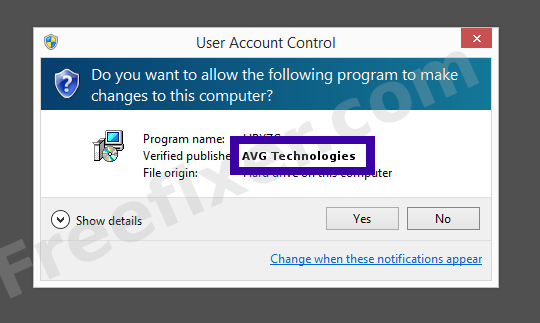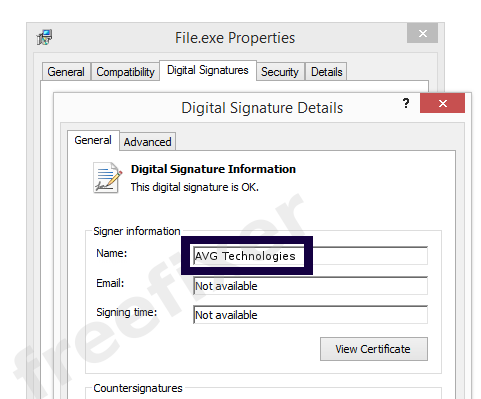AVG Technologies - 0.05% Detection Rate *
Did you just download a file that has been digitally signed by AVG Technologies and wonder if the file is safe? If that's the case, please read on.
You will probably see AVG Technologies when clicking to run the file. The publisher name is displayed as the "Verified publisher" in the UAC dialog as the screencap shows:

You can view additional details from the AVG Technologies certificate with the following procedure:
- Open Windows Explorer and locate the AVG Technologies file
- Right-click on the file and select Properties
- Click the Digital Signatures tab
- Click the View Certificate button
Here's a screenshot of a file that has been signed by AVG Technologies:

As you can see in the screencap above, Windows reports that "This digital signature is OK". This implies that the file has been published by AVG Technologies and that no one has tampered with the file.
If you click the View Certificate button shown in the screengrab above, you can view all the details of the certificate, such as when it was issued, who issued the certificate, how long it is valid, etc. You can also view the address for AVG Technologies, such as the street name, city and country.
VeriSign Class 3 Code Signing 2010 CA, VeriSign Class 3 Code Signing 2009-2 CA and VeriSign Class 3 Code Signing 2004 CA has issued the AVG Technologies certificates. You can also view the details of the issuer by clicking the View Certificate button shown in the screengrab above.
AVG Technologies Files
The following are the AVG Technologies files I've gathered, thanks to the FreeFixer users.
The FreeFixer tool treats files from AVG Technologies as trusted, which means that the AVG Technologies files will appear with a green background and that there's no removal checkbox for the file. However, as you can see in the scan results below, a few of the anti-virus scanners detects the AVG Technologies file(s). My guess is that those detections are false positives and that the files are safe. It's unlikely that AVG Technologies would ship a malware file.
| Detection Ratio | File Name |
|---|---|
| 1/45 | loggingserver.exe |
| 1/47 | ROC.exe |
| 1/48 | MachineIdCreator.exe |
| 1/46 | avgchsvx.exe |
| 1/46 | ToolbarUpdater.exe |
| 1/48 | avgtpx86.sys |
| 1/44 | toolbarupdater.exe |
| 2/48 | toolbarupdater.exe |
| 1/46 | vprot.exe |
| 1/42 | Uninstall.exe |
| 1/50 | vprot.exe |
| 0/48 | MachineIdCreator.exe |
| 0/46 | avgrsst.dll |
| 0/41 | ScriptHelper.exe |
| 0/46 | vprot.exe |
| 0/55 | WtuSystemSupport.exe |
| 0/43 | avgrsst%USERNAME%.dll |
| 0/44 | ToolbarUpdater.exe |
| 0/46 | ROC_roc_dec12.exe |
| 0/50 | avgrsstx.dll |
| 0/46 | avgsysx.dll |
Scanner and Detection Names
Here is the detection names for the AVG Technologies files. I've grouped the detection names by each scanner engine. Thanks to VirusTotal for the scan results.
As mentioned above, I think these detections are incorrect since it is very unlikely that AVG Technologies would ship a malware file.
| Scanner | Detection Names |
|---|---|
| AhnLab-V3 | Win-Trojan/Agent.945328 |
| Antiy-AVL | Trojan/Win32.Agent, Trojan/Win32.Patched.gen |
| Bkav | HW32.Nonim.yega |
| ClamAV | Win.Trojan.Agent-134735 |
| Emsisoft | Trojan.Generic.9353752 (B) |
| Jiangmin | Win32/Virut.bn, Backdoor/RBot.afyd |
| ViRobot | Trojan.Win32.S.Agent.945328 |
* How the Detection Percentage is Calculated
The detection percentage is based on that I have gathered 24036 scan results for the AVG Technologies files. 12 of these scan results came up with some sort of detection. You can review the full details of the scan reports by examining the files listed above.
Analysis Details
The analysis is done on certificates with the following serial numbers:
- 01da9de8d302acc5cdd5ab42eb5638db
- 6ca2b6fe1c4d3e87627921b534d44dd7
- 20ebfbcfc7970c887cb0510aa423a604
- 6266cc1b6d1f5c827661a2533136fd9e